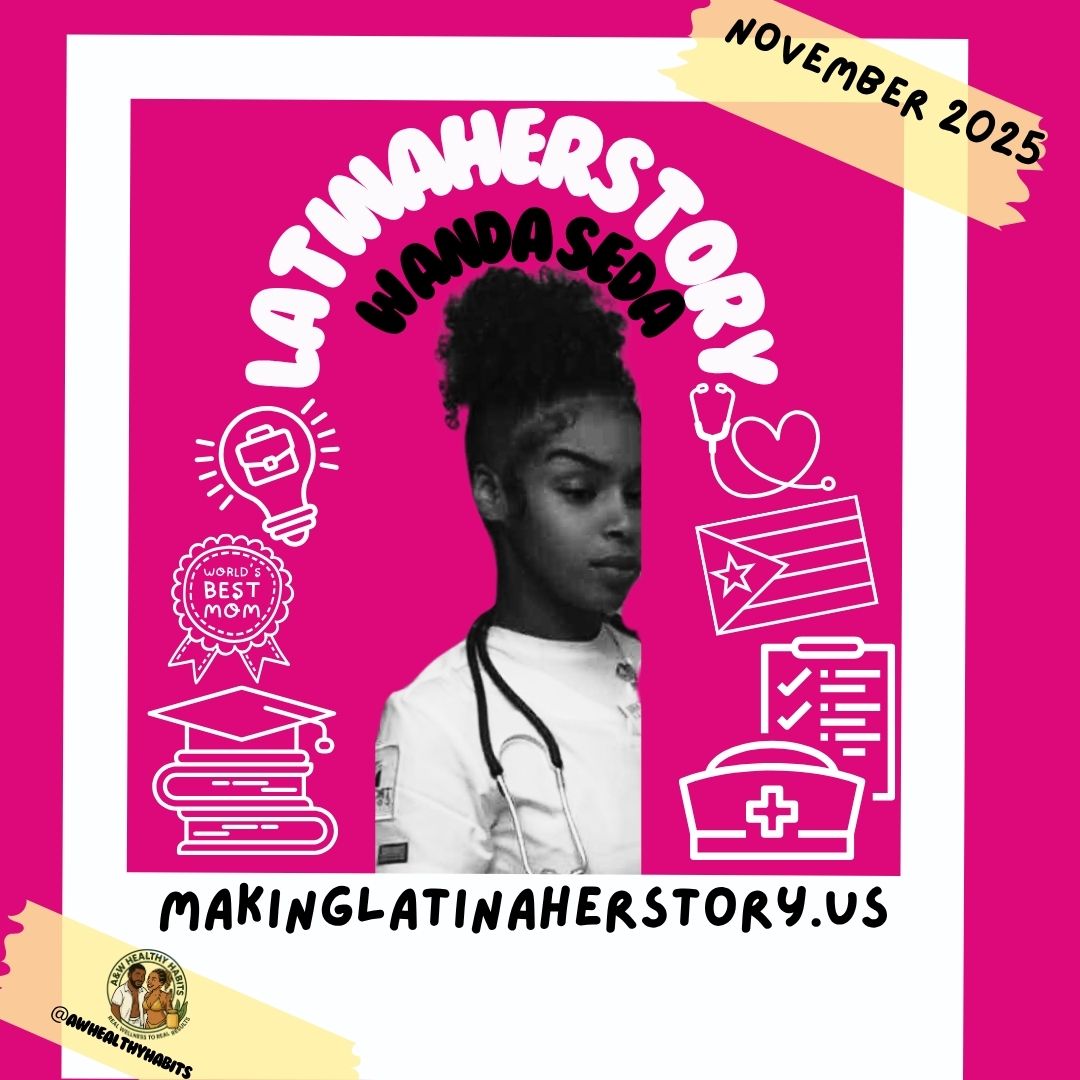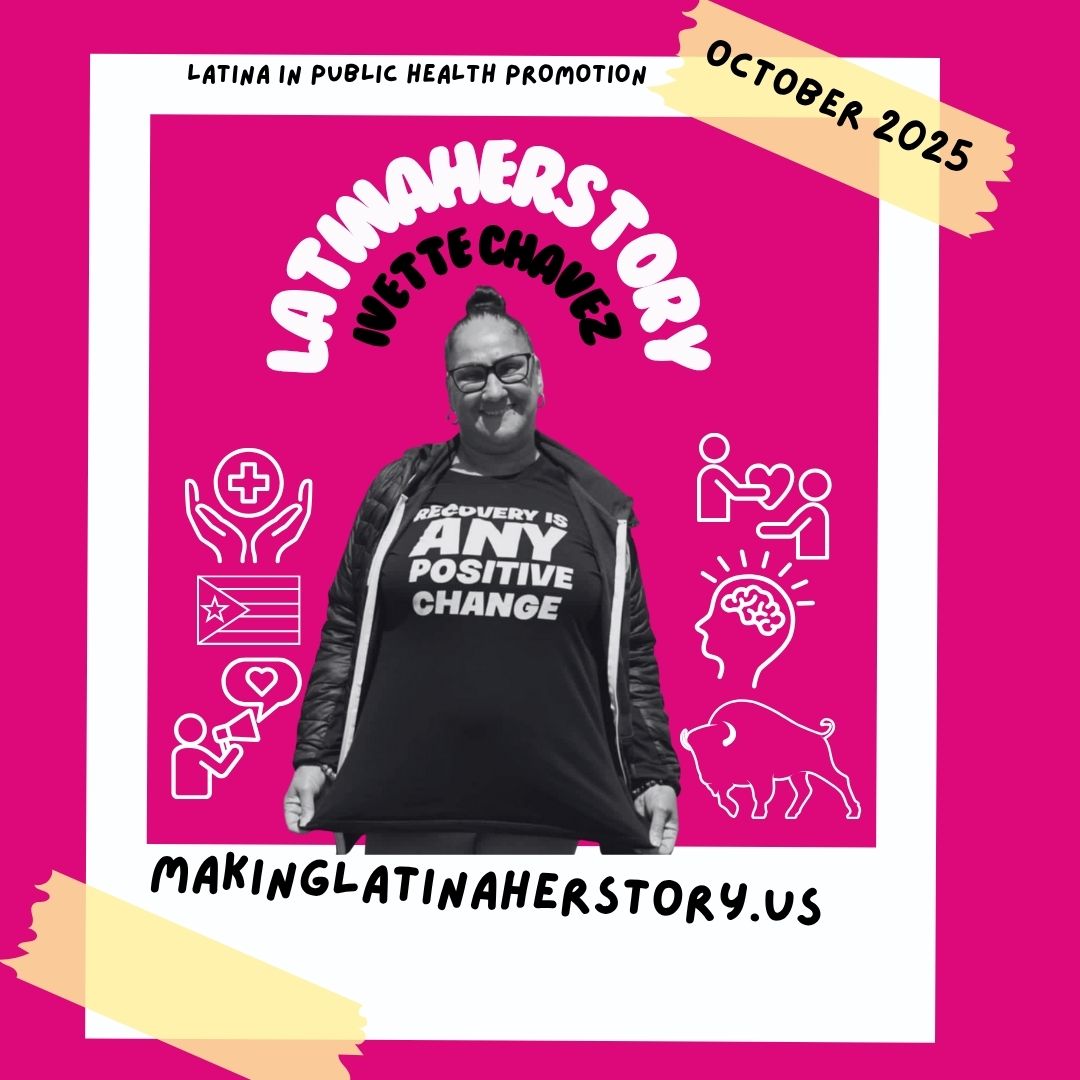LATINAHERSTORY
Stories of Latina Leaders.

My little cousin Wanda Lee, a proud Puerto Rican and Buffalo native, has had a plastic
stethoscope since she was four years old. She never put it down, closely monitoring our Titi’s
health as she managed diabetes and other conditions. Over time, her childhood play and
moments checking Titi’s blood sugar grew into an academic interest and lifelong passion for
medicine.
Wanda is a graduate of Health Sciences Charter School. She earned an A.S. from Bryant &
Stratton College and is currently enrolled at Trocaire College, pursuing her LPN (licensed practical nursing certification).
She — along with the Latina students learning beside her and those yet to come — is especially
needed in our regional nursing workforce. Their lived experiences, language skills, and
emotional intelligence bring depth and understanding to patient care. According to the New York
State Diversity and Inclusion in Nursing Toolkit published in 2024, representation remains “hard
work.” In 2015, 5.7% of LPNs in New York State identified as Latino — 1.8% lower than the national
rate. By 2022, that gap had widened, with only 3.9% of LPNs identifying as Latino, 7.6% below
the national rate.
Nurses are our most valued health first responders. With more Latinas than other groups
leaving the workforce during COVID-19 to care for families — and with many nurses nearing
retirement — the gap stands to widen.
Wanda works hard, like so many nursing students we see passing by with focused expressions,
large cups of coffee, bags full of nursing books, and exam schedules as demanding as the
exams themselves, to close the gap. As a mother to a beautiful baby girl, a co-founder of a
health-focused start-up with her partner, and a devoted friend, she is determined to bring her
passion for health to the hospital floor and excel in her calling. And she’s needed — as are more
like her.
With nursing there is both urgent need and wonderful opportunity — but we must remember that every
nurse is, at their core, a healer, helping to move patients, loved ones, and communities closer to
whole health. Many nurses have intersecting interests and many establish startups, so make sure
you follow Wanda’s tandem journey at A and W Healthy Habits on Facebook!
Now, According to the Bureau of Labor Statistics, the average salary for LPNs (Licensed
Practical Nurses) is $62,340 per year, with roughly 54,400 openings projected annually over the
next decade. The demand for licensed practical and vocational nurses is projected to grow
faster than supply between 2022 and 2037, resulting in a projected shortage of 302,440 LPN
FTEs (full time employees) by 2037. So for that reason remember, LPNs and other health
professionals are invaluable social capital — every big cup of coffee, every well-worn bag of
books carries a destiny worth encouraging and honoring.
November is National Diabetes Month, and from her early days checking Titi’s blood sugar,
Wanda — along with other future nurses — will help move us forward and shape the future of
medicine. Read her interview to learn more about her passion to serve. Her story reminds us
that those impacted by health challenges are uniquely positioned to become the health
professionals who help define what health means in an ever-changing world.
How do you balance everything?
I balance everything by focusing on the end goal. I strive to meet my goals and accomplish
everything I start. As a first-time mom and small business owner, my focus is to better our lives
and ensure my daughter never experiences some of the struggles I faced.
What impact do you want your nursing practice to have?
I want my nursing practice to impact the community and patients by delivering holistic care and
treatments that help each patient transform their lives and achieve longevity.

The human spirit is one of the strongest forces we never see.
In Buffalo, one woman has made it her life’s mission to protect and uplift that spirit.
Ivette Chavez (Fullenweider), a proud Puerto Rican, peer advocate, and Executive Director/Founder of Connections to Giving Back, a 501(c)3, is leading with empathy. Her leadership is not marked by titles or speeches—but by presence.
Founded in Buffalo, Connections to Giving Back is a grassroots, peer-led organization whose mission, as described on their Facebook page, is:
“To build community and support people who use drugs by providing food, clothing, and harm reduction supplies.”
Their work is grounded in the philosophy of harm reduction. According to the Johns Hopkins Bloomberg School of Public Health, the goal of harm reduction is simple: save lives and protect health. But for Ivette, it’s also about dignity.
She meets people where they are—literally. Her leadership is rooted in lived experience and authenticity.
At the heart of her work is the important message:
You are worthy. Right now. As you are.
This philosophy, though simple, is powerful—and sorely needed in a world where people fighting dependency are too often dismissed, dehumanized, or blamed. Through acts of care like handing out warm clothing, hygiene kits, and harm reduction supplies, Connections to Giving Back offers hope as an acknowledgement of shared humanity.
Ivette's approach emphasizes the strength in vulnerability, values people over systems, and insists empowerment begins with active listening. She is not just advocating for individuals on their recovery journey; she’s also changing the way we understand leadership, community, and public health.
This October marks Health Literacy Month, a time to reflect on how we communicate health information—It reminds us that empowering people starts with compassion.
Organizations like Connections to Giving Back bring health conversations beyond the exam room, making them approachable, relevant, and rooted in trust. As we recognize Health Literacy Month, let’s also lift up and support the people doing the work—on the ground, every day.
Follow Connections to Giving Back on Facebook. Donate, volunteer, or simply share their mission. And most of all, remember: the power of empathy starts with us.
It begins in the quiet choices—to listen, to withhold judgment, to show up. Leaders like Ivette remind us that real change isn’t top-down; it’s built hand-in-hand, heart-to-heart, outside in the spaces where trust is earned and humility is an asset.
As we move through Health Literacy Month and beyond, may we all strive to communicate not just with words, but with presence. As a community we have work to do, despite improvements, significant differences remain: between 2015 and 2022, the uninsured rate for Latinos fell by 2.8 percentage points, with 6 million more gaining coverage.
Latinos are still more than twice as likely as non-Latino Whites to be uninsured. In 2022, Latinos made up 21% of the non-elderly population but accounted for 39% of the uninsured. (ASPE, 2024). Knowing our stats, may we choose understanding over stigma, and dignity over distance. Because when we lead with empathy, we don't just support others—we build a stronger, more resilient, healthier future.